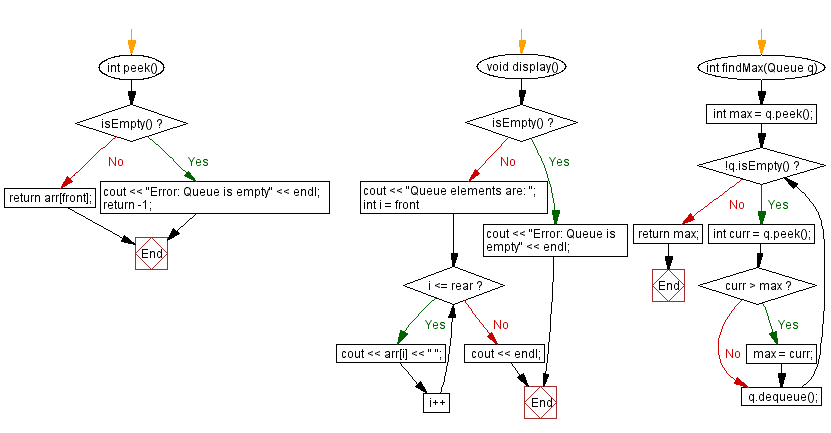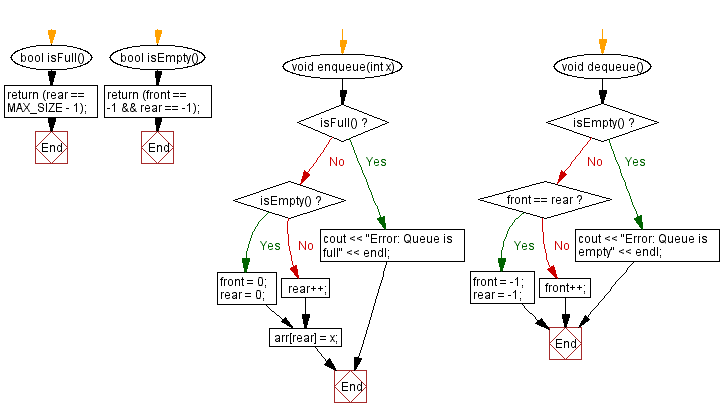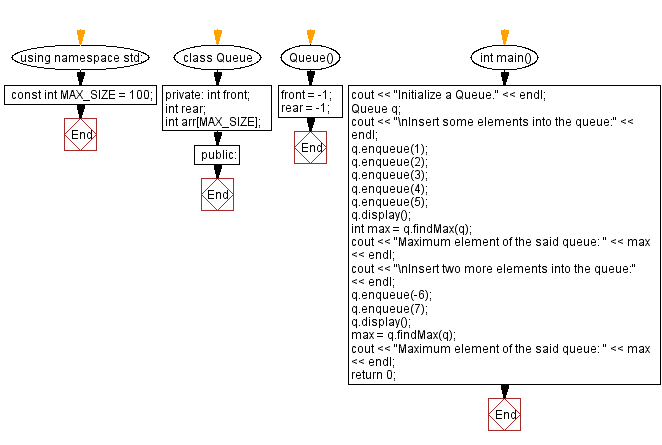C++ Queue Exercises: Find the maximum element of a queue
9. Maximum Element in a Queue
Write a C++ program to find the maximum element of a queue.
Sample Solution:
C Code:
#include <iostream>
#include <map>
#include <cmath>
using namespace std;
const int MAX_SIZE = 100;
class Queue {
private:
int front; // Front index of the queue
int rear; // Rear index of the queue
int arr[MAX_SIZE]; // Array to store elements
public:
Queue() {
front = -1; // Initialize front index to -1
rear = -1; // Initialize rear index to -1
}
bool isFull() {
return (rear == MAX_SIZE - 1); // Check if the queue is full
}
bool isEmpty() {
return (front == -1 && rear == -1); // Check if the queue is empty
}
void enqueue(int x) {
if (isFull()) {
cout << "Error: Queue is full" << endl; // Display error message if the queue is full
return;
}
if (isEmpty()) {
front = 0;
rear = 0;
} else {
rear++;
}
arr[rear] = x; // Insert the element at the rear index
}
void dequeue() {
if (isEmpty()) {
cout << "Error: Queue is empty" << endl; // Display error message if the queue is empty
return;
}
if (front == rear) {
front = -1;
rear = -1;
} else {
front++;
}
}
int peek() {
if (isEmpty()) {
cout << "Error: Queue is empty" << endl; // Display error message if the queue is empty
return -1;
}
return arr[front]; // Return the element at the front of the queue
}
void display() {
if (isEmpty()) {
cout << "Error: Queue is empty" << endl; // Display error message if the queue is empty
return;
}
cout << "Queue elements are: ";
for (int i = front; i <= rear; i++) {
cout << arr[i] << " "; // Display all elements in the queue
}
cout << endl;
}
int findMax(Queue q) {
int max = q.peek(); // Initialize max with the first element of the queue
while (!q.isEmpty()) {
int curr = q.peek(); // Get the current element
if (curr > max) {
max = curr; // Update max if the current element is greater
}
q.dequeue(); // Remove the element from the queue
}
return max; // Return the maximum element
}
};
int main() {
cout << "Initialize a Queue." << endl;
Queue q;
cout << "\nInsert some elements into the queue:" << endl;
q.enqueue(1);
q.enqueue(2);
q.enqueue(3);
q.enqueue(4);
q.enqueue(5);
q.display();
int max = q.findMax(q); // Find the maximum element in the queue
cout << "Maximum element of the said queue: " << max << endl;
cout << "\nInsert two more elements into the queue:" << endl;
q.enqueue(-6);
q.enqueue(7);
q.display();
max = q.findMax(q); // Find the maximum element again after inserting new elements
cout << "Maximum element of the said queue: " << max << endl;
return 0;
}
Sample Output:
Initialize a Queue. Insert some elements into the queue: Queue elements are: 1 2 3 4 5 Maximum element of the said queue: 5 Insert two more elements into the queue: Queue elements are: 1 2 3 4 5 -6 7 Maximum element of the said queue: 7
Flowchart:



For more Practice: Solve these Related Problems:
- Write a C++ program to find the maximum element in a queue by iterating through its contents without modifying it.
- Write a C++ program that locates the maximum value in a queue and highlights its index position.
- Write a C++ program to implement a queue and update the maximum element in real-time as new items are enqueued.
- Write a C++ program to determine the maximum element in a queue using both iterative and recursive approaches.
Go to:
PREV : Mean, Variance, and Standard Deviation of Queue Elements.
NEXT : Minimum Element in a Queue.
CPP Code Editor:
Contribute your code and comments through Disqus.
What is the difficulty level of this exercise?
